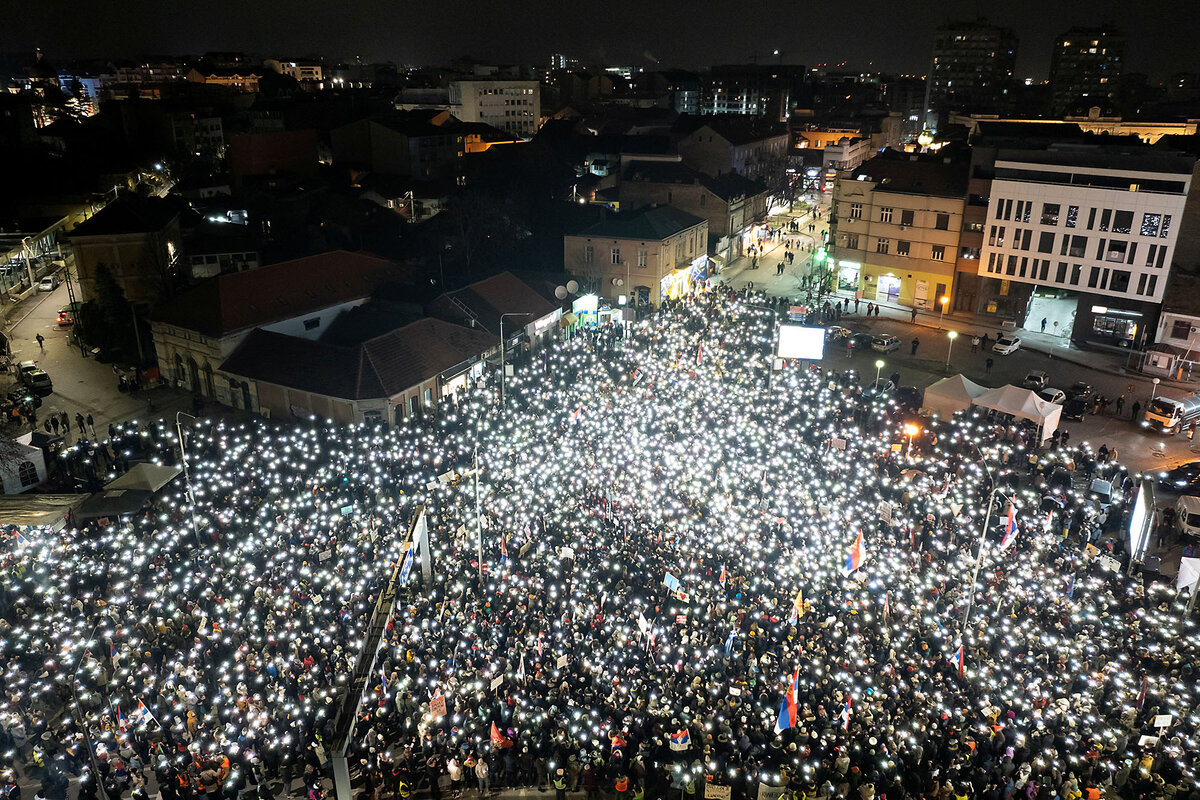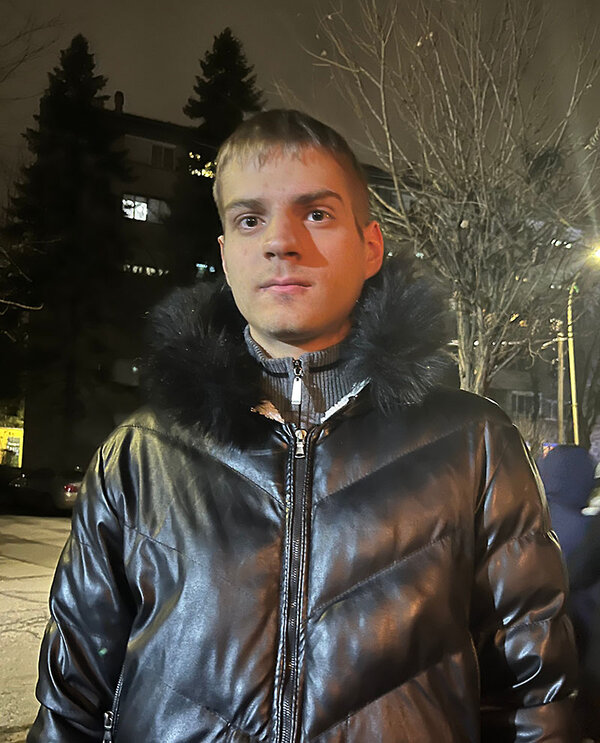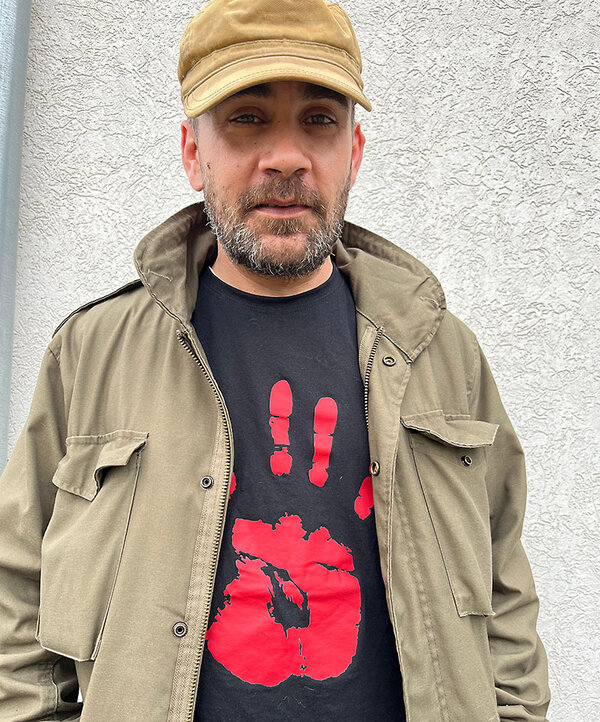Who will end government corruption? In Serbia, it may be the students.
Loading...
| Kragujevac, Serbia
It’s 5:30 in the evening on a recent Saturday. In the wide, tree-fringed avenues of the city of Sremska Mitrovica, a rally organized by the ruling Serbian Progressive Party to mark Serbia’s Statehood Day is underway.
Serbian President Aleksandar Vučić is clear in his speech to thousands of supporters gathered there. He declares that he has defeated a foreign-funded “color revolution” – a term he uses to belittle a student-led protest movement that is testing his grip on power.
“The textbook on how I defeated the color revolution will be the world’s bestselling book,” he tells the torch-waving crowd.
Why We Wrote This
While much of Europe is wrestling with resurgent far-right politics, Serbia stands apart thanks to a student-led mass movement against corruption and the nation’s strongman president.
As he speaks, an anti-corruption protest led by students and supported by broad sectors of society has entered its ninth hour in Kragujevac, an industrial city 200 kilometers (125 miles) away in central Serbia, where people from all over the country had converged.
The city oozes positive energy. This is partly an echo of the previous night’s events when Kragujevac, a former Serbian capital, welcomed the students. Many of them had walked up to 200 km to get there, setting off days earlier and only arriving Friday evening. They were met with countless hugs, kisses, and tears of joy from complete strangers.
Such scenes have played out in Serbia week after week since the concrete canopy of the railway station in Novi Sad collapsed Nov. 1, 2024, killing 15 people and injuring two. The tragedy, coming so soon after a renovation project that cost €65 million ($67.7 million), put an immediate spotlight on graft in Serbia – both in the railway project and within the government more broadly.
“This is an outcry against corruption more than anything else,” explains a university student of philosophy who attended the protest and spoke on condition of anonymity. “There are 15 lives that will never be continued because of the corruption and the shoddiness of the work,” he says. “That’s why the outrage has been so great in Serbia. This is like the straw that broke the camel’s back.”
Corruption in Serbia
Corruption is a long-running problem in Serbia. One form of it is the circumvention of public procurement laws by implementing state-to-state agreements – in particular with China, but also with other countries, according to Serbia Transparency International program director Nemanja Nenadic.
“For years, there was a kind of apathy among citizens because they feel it is not possible to change that setup,” he says. “Now the student protests and the many citizens that are joining this protest brought a new perspective and some optimism.”
Students have been at the forefront of the protests, blocking their universities and setting demands for the government. The core demand is a request that all documents on the procurement and construction process for the Novi Sad station are made public “so the courts can do their jobs.” The students are also calling for a 20% budget increase for education. Despite official assertions, the students’ demands have yet to be met.
The student movement intentionally has no clear figurehead at its helm. But teachers support it. So do lawyers, who declared a 30-day strike Feb. 4, the third time they've backed the students actively. Farmers also have joined in some rallies, and actors have staged marches in Belgrade.
“Many people connect ... what happened [with corruption],” says Mr. Nenadic, “but it is still very hard to say whether and to which extent it contributed to the tragedy.”
Public suspicions have bolstered support for the protesting students. Throughout their journey to Kragujevac, they have been welcomed with open arms; people offered food and supplies in every town they passed through. They also had medical support, as walking enormous distances in freezing temperatures, over icy and treacherous terrain, was no easy feat.
“It doesn’t hurt anymore!” one female student shouted into the cameras as she entered the city at 2 a.m. “Nothing hurts anymore!”
More supporters arrived in the city using their own transportation. “If [students] can walk from Niš and Belgrade, we can drive on four wheels,” says Milan Miljković, who came from Niš. “We’re here to support this movement in every way we can.”
A revolutionary moment?
The gathering in Kragujevac is just one manifestation of the largest popular revolt in Serbia since the overthrow of Slobodan Milošević, in which students played a key role. And it reflects a word – almost forgotten in the bleak everyday life of Serbia’s grinding economic transition – that has now become one of the most important in Serbian society: solidarity.
The sense of unity and belonging to a just cause is spreading across the country, despite the government’s efforts to suppress it.
“We can talk about a revolutionary situation at the moment,” says historian Dejan Djokić, author of “A Concise History of Serbia.” The protests have spread to almost all the 200 municipalities of the country, including small towns in the south and east of the country, where the ruling party enjoys the most support.
At various locations in Kragujevac, people are cooking food and making warm drinks for those who have traveled to the city – for free. Lazar Gligorijević, a local, even turned his family home’s front yard into a free parking space for visitors supporting the students.
“I don’t think anyone expected this many people. But here we are; Serbia has finally risen against this regime and this twisted system that serves no one,” he says.
In Sremska Mitrovica, the government rally attendees were bused in by the ruling party, with at least some of the participants saying they had received a payment to stand in front of President Vučić.
On the other hand, for students and citizens in Kragujevac, taxi drivers offered free rides to take them back home at their own expense, for no reason at all. Except one: solidarity.
“People have lost fear, and this is important,” says Mr. Djokić, the historian. “This is where the students have played a major role. Vučić doesn’t know how to deal with this.”
Dominique Soguel contributed reporting from Basel, Switzerland.







